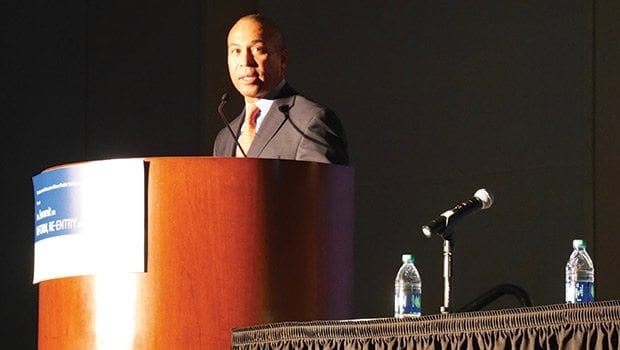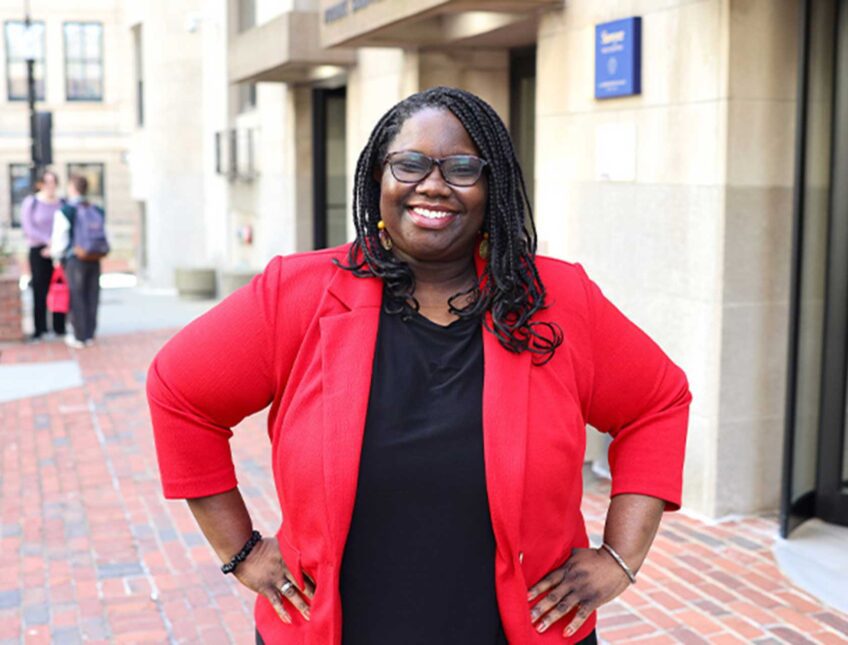
A summit last week highlighted Governor Deval Patrick’s record of criminal justice reforms and provided a forum for conversations on best practices for prisoner re-entry and the use of data to support and sustain reforms.
“Reform, Re-Entry and Results: Promoting Progress in the Criminal Justice System,” held at UMass Boston on Dec. 18, featured a slate of speakers including Patrick, Executive Office of Public Safety and Security Secretary Andrea Cabral, MassINC President Greg Torres, Undersecretary of Criminal Justice Sandra McCroom, former Boston Police Department Commissioner Edward Davis, and Christine Cole, executive director of the Crime and Justice Institute at Community Resources for Justice.
Torres, in his introduction of Patrick, praised the governor for “reform of a criminal justice system that has incarcerated too many for too long, cost too much, warehoused people, devastated communities of color and has made no sense to the general public whose tax dollars finance it.”
He cited his organization’s data that shows an evolution in public opinion on criminal justice, from “busting rocks” to shorter sentences and greater access to treatment programs. A MassINC Polling Group report earlier this year indicated that 85 percent of respondents statewide support a reform agenda that includes rehabilitation, increased use of probation and judicial discretion instead of mandatory sentences, he said.
Torres listed numerous actions the Patrick Administration has taken: Criminal Offender Record Information reform; sentencing reform, including changes to parole and probation; new re-entry initiatives; and a newly invigorated Massachusetts Sentencing Commission.
“Unlike years past when the sensational crime of the day drove policy, work on positive reform measures is being conducted at the highest levels of the three branches of government,” Torres said.
And finally, Torres highlighted what may be one of Patrick’s most significant long-term impacts: his large number and diversity of judicial appointments. Five of seven members of the Supreme Judicial Court, and nearly half of all the state’s 411 judges are Patrick appointees. Overall, 45 percent of his appointees have been female and 18 percent come from minority groups.
For Patrick, the event was a chance to deliver a farewell address of sorts to an audience of some 500 nonprofit, law enforcement, judicial, government and grassroots leaders passionate about reforming criminal justice systems.
“Thank you for making a personal choice not to discard your neighbors,” he said, “but instead to think about how we reintegrate the overwhelming number of people who will get out one day, and who we all need to succeed.”
Patrick said he has taken a “pragmatic, long-term approach” to criminal justice instead of focusing on the next election cycle or news cycle. He highlighted his administration’s accomplishments, including reducing mandatory sentences for non-violent drug crimes; redefining the size of school zones to be fairer to urban offenders; increasing the chances for prisoners to earn “good time” for program participation in order to help them develop skills while in prison; new transparency and evidence-based policies for the Parole Board; the Safe and Successful Youth violence prevention strategy; greater focus on mental illness services and special mental health courts that divert people from the prison system; and better service to victims and the public with stronger repeat offender and restraining order measures.
“This is what I think it means to govern for the next generation,” Patrick said.
On the CORI changes he signed into law in 2010, he said, “57,029 times, ex-offenders applying for jobs, seeking housing or volunteer opportunities were able to take advantage of those opportunities without being automatically disqualified.”
Following the speaking program, separate panel discussions focused on using data to support criminal justice and on improving re-entry systems and outcomes.
In the re-entry panel session, moderator Edward Davis posed questions to four panelists: Chelsea Police Chief Brian Kyes; Suffolk County Sheriff Steven Tompkins; Department of Youth Services Commissioner Peter Forbes; and Harry Spence, Court Administrator of the Massachusetts Trial Court.
Much was made of the Chelsea Police Department’s progress in community policing, including such trust-building initiatives as “Coffee with Cops” where community residents can drop by and converse with officers.
“You have to get out of the car, you’ve got to interact with people, so they know you on a first name basis,” said Kyes.
Spence, who worked to increase community policing in Chelsea in his earlier role as receiver there, voiced high praise of Roca, the Chelsea-based organization that engages with young men involved with juvenile justice and prison systems and partners with Chelsea police to address youth needs.
Spence also lauded judges around the state who are experimenting with positive incentives in probation such as arranging to cut probation time upon successful completion of a GED.
Tompkins offered that his department is working on a “continuum of care” that includes bringing services into prison before prisoners are released and urging ex-convicts to stay in touch so the Sheriff’s Department can help link them to services later. He mentioned that he will be joining incoming Governor Charlie Baker’s transition team and hopes to convene all the state’s sheriffs soon to help inform the new administration on public safety issues.
Afterward, state Rep. Linda Dorcena Forry said the panel discussion on re-entry provided a useful window on what’s working and what is still needed.
“It was good to really hear what they need on the legislative side,” she said. “I want to make sure if programs are working, they continue.”
She also commented that increasing the age of juvenile court jurisdiction from 17 to 18 is “a big deal” and that connecting people to services while still inside prison clearly works.
Cabral told the Banner she felt the summit’s takeaway was that it is possible to fundamentally change the criminal justice system in a short time, even though the system moves at a “glacial pace” traditionally.
“By being intentional, deliberate and relentless, you can move the needle. And once you start, momentum keeps it in motion,” Cabral said. “But it doesn’t happen without the governor.”
The Summit on Reform, Re-Entry and Results was presented by the Executive Office of Public Safety and Security in partnership with MassINC, Community Resources for Justice, the Massachusetts Bar Association, Massachusetts Correctional Industries and the Massachusetts Criminal Justice Reform Coalition.

![Banner [Virtual] Art Gallery](https://baystatebanner.com/wp-content/uploads/2024/04/NJ-H_1-150x150.jpg)




